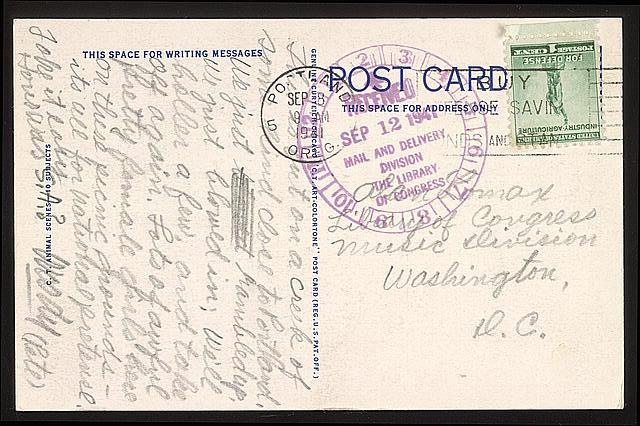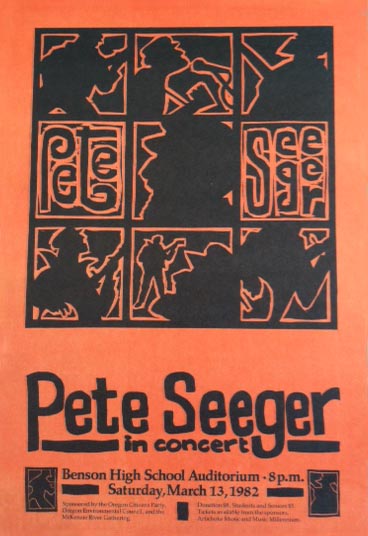It is sometimes hard to believe that one month in the life of a twenty-eight-year-old Oklahoma-born folk singer could have a lasting impact on an entire geographic region, but such is the case with Woody Guthrie in the Pacific Northwest.
Guthrie was one of the country’s most prolific songwriters, whose ballads spoke to and about everyman. He traveled through the American landscape during the 1930s, 1940s, and 1950s, experiencing and writing about the people of the Great Depression, the Dust Bowl, World War II, and social and political events. His “people’s songs,” as he called them, were his greatest legacy.
Woodrow Wilson Guthrie was born and raised in Okemah, Oklahoma, and Pampa, Texas, during the Dust Bowl years of the 1930s. It was in Pampa where he learned to play guitar, married his first wife, Mary Jennings, and started his cross-country travels that would eventually take him to Portland in May 1941. And it was the Bonneville Power Administration, a four-year-old agency, that set the stage for Guthrie's historic month in the Pacific Northwest.
Congress had passed the Bonneville Project Act in 1937 to distribute the electricity generated at Bonneville and Grand Coulee dams on the Columbia River. The law said publicly-created utilities had preference, or first choice, on that power; investor-owned utilities could buy any surplus. The law also provided a block of power to new heavy industries that bolstered the region’s contributions during World War II. A new power agency, the Bonneville Power Project, set up an office in Portland to sell the electricity as prescribed. The project was renamed the Bonneville Power Administration (BPA) in 1940.
In 1938, the BPA had made a motion picture, Hydro, to inform the public about the new electricity and ways to obtain it. The agency’s first public information officer, Stephen B. Kahn (1911-2007), had produced Hydro, and he wanted a second movie to illuminate the advantages of public power. He believed that having a folk singer involved would help give the movie a "common touch," and he wrote a job description for an actor, narrator, and songwriter to work for a year on the project.
In early 1941, Kahn contacted Allen Lomax, head of the Archive of Folk Song at the Library of Congress. Lomax and Guthrie were friends, and Lomax recommended him for the job. In late March, BPA representatives went to Los Angeles to meet with Guthrie, who was unemployed at the time. They discussed the project, took pictures, gave him application forms, and left him with the impression that the job might be his, but no promises.
Between that visit and Guthrie’s arrival in Portland in early May, Kahn had second thoughts about a year-long appointment, primarily because it would require review by the Department of the Interior in Washington, D.C. He also was concerned about some of Guthrie's politics; the singer had developed a talent for controversial social commentary and criticism, taking on causes and writing songs of political protest and activism. Even though Kahn was progressive and an activist himself, he thought Guthrie’s writings might have made the agency leaders nervous. So he modified the job description and made it a one-month emergency position. Guthrie was hired, and Kahn reasoned that the work would be finished before headquarters could get involved.
Guthrie started writing almost immediately. Taking a cue from a Columbia River history book Kahn gave him, Guthrie penned the now-famous verses to "Roll On, Columbia," which has become a Northwest anthem and the official folk song of Washington state. Kahn assigned Guthrie a driver, Elmer Buehler (1911-) of Portland, who organized trips to Grand Coulee and Bonneville dams and to Mount Hood by way of the orchard country of the Columbia River Gorge. On those trips, Guthrie scribbled down ideas for songs.
Kahn required at least a song a day from Guthrie, but for Guthrie a song a day was easy, especially when he used some previously written lines and melodies that he edited to fit the Northwest scenes he was depicting. In thirty days, Guthrie wrote twenty-six songs, including "Jackhammer Blues," "Roll Columbia, Roll," "The Grand Coulee Dam," "Pastures of Plenty," and "Hard Travelin’." He was paid $266.66, which Kahn said was one of the best bargains the U.S. government ever got.
While in Portland, Guthrie recorded a dozen or more of the songs onto acetate discs cut in a basement closet at the BPA building on Northeast Ninth Avenue. In 1942, Reeves Recording studio in New York recorded a half-dozen songs onto movie synchronization tracks. Three of the tracks made it to the final sound track of The Columbia, the movie produced by BPA in 1948.
Subsequently, Guthrie recorded a few of the Columbia River songs on commercial albums and others were published in songbooks, but nearly half the original collection disappeared. In 1987, the lyrics to all twenty-six songs and recordings for seventeen of them were recovered and all were published as part of BPA's fiftieth-anniversary celebration.
-
![Woody Guthrie.]()
Guthrie, Woody, bb006294.
Woody Guthrie. Oreg. Hist. Soc. Research Lib., , bb006294
-
![Postcard to Allen Lomax from Guthrie while Guthrie was in Oregon on tour with the Almanac Singers, Sep. 12, 1941.]()
Guthrie, Woody, postcard, 1941, reverse.
Postcard to Allen Lomax from Guthrie while Guthrie was in Oregon on tour with the Almanac Singers, Sep. 12, 1941. Lib. of Cong., Archive of Folk Culture, American Folklife Center
Related Entries
-
![Bonneville Dam]()
Bonneville Dam
The U.S. Army Corps of Engineers built and operated Bonneville Lock and…
-
![Columbia River]()
Columbia River
The River For more than ten millennia, the Columbia River has been the…
-
![Pete Seeger in Oregon]()
Pete Seeger in Oregon
Between 1941 and 1995, folksinger and composer Pete Seeger made as many…
Related Historical Records
Map This on the Oregon History WayFinder
The Oregon History Wayfinder is an interactive map that identifies significant places, people, and events in Oregon history.
Further Reading
Cray, Ed. Ramblin' Man, The Life and Times of Woody Guthrie. New York: W.W. Norton & Company, 2004.
Klein, Joe. Woody Guthrie, A Life. New York: Alfred A. Knopf, Inc., 1980.
Woody Guthrie website. http://www.woodyguthrie.org/index.htm





